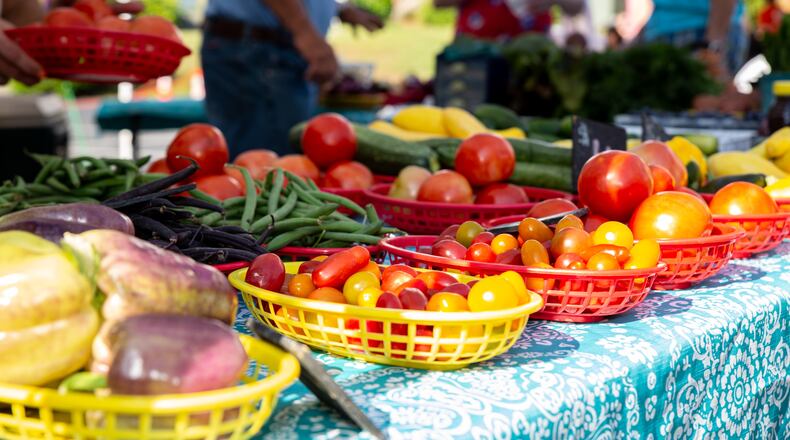The Ohio Ecological Food and Farm Association (OEFFA), the Ohio Farmers Market Network, the Ohio Food Policy Network and Produce Perks Midwest released a report this week making several policy recommendations for Ohio’s decision-makers on how to build a more secure food system in the state.
“(The coronavirus) paralyzed our country and broke many links in the centralized global food supply chain. Grocery store shelves went bare, animals were euthanize, milk was dumped and families went hungry,” said Amalie Lipstreu, OEFFA policy director.
Those recommendations included establishing an inter-agency food work group to strategize building out farmers markets’ capacities, including creating online stores for farmers markets and local farmers, and how to fund those changes. The four organizations also supported passing the HEROES Act with aid for those selling into local food systems.
MORE: Nation sees 4.8 million new jobs in June
Farmers markets
Farmers markets have had to adapt during the coronavirus crisis.
Smaller local and regional farmers and farmers markets provide a local access point for food in many Ohio communities. At all farmers markets in the state, there is at least one vendor who accepts SNAP or WIC benefits, said Jaime Hadji of the Ohio Farmers Market Network.
“Farmers markets have demonstrated resilience,” Hadji said. “Investment is needed to keep farmers markets and to keep food access.”
Ross Olson, the manager of the Oxford Farmers Market in Butler County, said the market stayed open. When the pandemic began, Olson wrote a letter to the community, saying that the market would stay open and have plenty of food.
“As grocery stores shelves are emptied, and many worry how long we will have to go without, I take comfort in knowing that our local farmers have been hard at work to provide a bountiful harvest, all year long,” Olson said in the letter.
The market there has changed drastically because of the coronavirus by adding an ecommerce shop.
“Boy, have we had to change,” Olson said.
Olson said because of the coronavirus pandemic, the Oxford Farmers Market set up an ecommerce site. Customers can order online and pick up their food on Tuesdays in the parking lot outside of TJ Maxx and Moon Co-op. Olson said the farmers market got a special coronavirus grant from the Oxford Community Foundation to help set up the site.
“Having that financial backing helped us move forward with the ecommerce site,” Olson said.
Olson said the farmers market had previously discussed selling produce and other products online, but had tabled the idea before the pandemic because of a lack of funding.
The Oxford Farmers Market also accepts SNAP, Produce Perks and WIC benefits. Oxford also has a senior farmers market program. The farmers market even accept those food benefits online, which Olson hopes makes the benefits more accessible.
“We haven’t had people take advantage of it, but I’m sure there are people in the community who could use these programs,” Olson said.
HEROES Act
The HEROES Act, Olson said, would help “bring everything up to speed” for the farmers market.
“The value that these vendors bring is really being seen in a time like this,” Olson said. “The importance of farmers, local produce and local food is being recognized.”
Food system experts say federal or state funding would be a more sustainable solution to holes in Ohio’s food system. In addition to aid for families, federal programs and funding for additional coronavirus testing, the HEROES Act passed by the House includes a $100 million appropriation for specialty crop growers. In the CARES Act this funding was to help farmers offset losses due to the pandemic, but it was mostly specialty crop growers that were left out, said Lipstreu.
The group is asking that language be included in the HEROES Act so that this relief would be targeted to growers that sell into direct to consumer markets, like farmers who sell at farmers markets.
The bill also includes funding for the Local Agriculture Market Program which could be used to support farmers, farmers market operators and food system organizations to develop new, alternative marketing projects in response to the pandemic.
The U.S. Senate will consider the HEROES Act later this month.
About the Author

